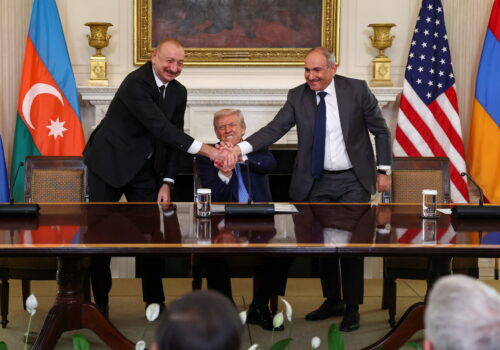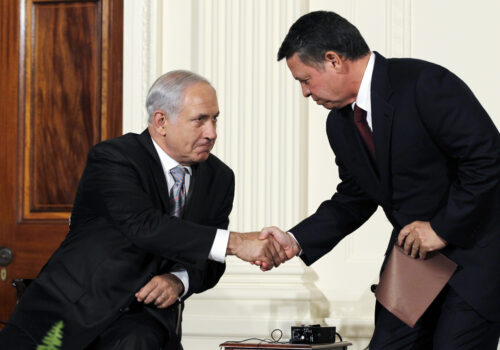The Indonesia-Israel visit that didn’t happen—and why it still matters
When recent reports surfaced that Indonesian President Prabowo Subianto might visit Israel, speculation swirled that Jakarta was taking its first step toward joining the Abraham Accords and setting the stage for a historic diplomatic realignment.
The reports of the visit came amid cautious optimism in the Middle East—following the Israel-Hamas cease-fire and the release of twenty-hostages—that diplomacy might prevail where war has failed. However, within hours of the first such reports, Jakarta firmly denied the claim and reaffirmed its longstanding support for the Palestinians.
The episode underscored how swiftly the Middle East’s diplomatic map is being redrawn since the cease-fire began this month. It revealed both the pressures and opportunities facing countries such as Indonesia, as they navigate domestic opinion, Islamic solidarity, and a shifting global order increasingly shaped by Washington under US President Donald Trump.
If managed carefully, engagement between Israel and Indonesia could reshape both economies and their strategic outlooks. Yet these opportunities are tempered by profound political and social risks. Both sides must therefore navigate a narrow path between opportunity and overreach.
From distance to discreet engagement
Since its independence, Indonesia has not maintained any diplomatic ties with Israel, reflecting Jakarta’s alignment with the Palestinian cause and its constitution’s anti-colonial ethos. Indonesia’s founding president, Sukarno, viewed Israel through the prism of colonialism; he refused to host Israel’s team at the 1962 Asian Games in Jakarta, and even withdrew Indonesia from the 1958 World Cup qualifiers rather than face the Israeli national team.
SIGN UP FOR THIS WEEK IN THE MIDEAST NEWSLETTER
Successive leaders reaffirmed that diplomatic relations would follow only after Palestinian independence. Public sympathy in Indonesia for the Palestinians remains strong, shaped by the country’s Islamic identity and decades of solidarity campaigns.
Yet beneath this rhetoric, quiet engagement persisted. Under the country’s second and longest-serving president, Suharto, Indonesia maintained covert military and intelligence ties with Israel in the 1970s and 1980s, procuring weapons and training via intermediaries. Indonesia occasionally tested limited engagement; former President Abdurrahman Wahid even proposed trade relations in 1999, but every overture faced domestic backlash. In 2005, there were reports of a discreet meeting between Israeli and Indonesian officials on the sidelines of the United Nations, but then President Susilo Bambang Yudhoyono promptly ruled out formal ties “until the Palestinian people gain independence.” Similarly, former President Joko Widodo rejected Prime Minister Benjamin Netanyahu’s 2016 normalization proposal, insisting on Palestinian statehood first.
Public sentiment, rooted in moral and religious grounds, has long constrained Indonesian leaders from opening up to overt engagement with the Israelis. For example, in March 2023, Indonesia was stripped of hosting the Under-20 World Cup by FIFA after domestic outcry over the Israeli youth team’s participation. Later that year, as the war in Gaza escalated, Indonesian officials loudly condemned Israeli military activity around the Indonesian-funded hospital in the Palestinian enclave, with Jakarta’s foreign minister issuing the “harshest of condemnations.”
Despite political frost, limited business and tourism ties have persisted. Indonesian and Israeli firms trade indirectly, with bilateral trade reaching several hundred million dollars annually. Tourism has also quietly flourished—despite a decline since the war in Gaza began, according to Israel Travel News. In 2018, for example, over 37,000 Indonesians, mostly pilgrims, visited Jerusalem’s holy sites despite the lack of formal relations. Such exchanges reflect mutual curiosity beneath official hostility, though they kept deliberately low profile to avoid domestic backlash.
Why now: Cease-fire, Trump and Prabowo’s pragmatism
Three developments have converged to create a diplomatic opening between Indonesia and Israel.
1. The Gaza cease-fire opened diplomatic space. This month’s truce between Israel and Hamas, mediated by Washington, halted years of war and enables humanitarian aid to flow. Indonesia praised it as a crucial step toward peace and offered to help rebuild Gaza. As regional powers compete for influence in the conflict’s aftermath, Jakarta may have realized that engagement, rather than isolation, could better support Palestinian recovery and allow Indonesia to play a constructive role in the peace process. Now, Prabowo’s government has offered to take a bigger role and assist in Gaza’s reconstruction, emphasizing that a just solution requires both Israel’s security and Palestinian sovereignty.
2. Trump’s return revived US normalization diplomacy. The new Trump administration immediately revived the Abraham Accords framework, viewing Saudi Arabia and Indonesia as next-tier normalization targets. Washington has reportedly offered incentives, including backing Indonesia’s accession to the Organisation for Economic Co-operation and Development (OECD), which requires approval from all member states, Israel among them. Reports from 2024 already linked Jakarta’s quiet outreach to Israel to these incentives. Now, with Trump back in power and determined to deliver another “deal of the century” (and notably to win the Nobel Peace Prize), Indonesia dovetails with Washington’s strategic goals.
3. Prabowo’s pragmatism. Since taking office in 2024, Prabowo has pursued a more assertive and pragmatic foreign policy than his predecessors. At the UN General Assembly in September, he stunned observers by declaring that “we must guarantee the safety and security of Israel. Only then can we have real peace.” His unprecedented “shalom” closing signaled a philosophical pivot: recognizing Israel’s security as a prerequisite for Palestinian statehood. Though he previously vowed not to normalize before independence, Prabowo may view engagement with Israel as a means to achieve, not betray, that goal. Reporting from regional media indicated that Prabowo had cautiously agreed to an Israel visit, which would have been a bold political gamble—one likely made possible by careful coalition-building at home. With his Advanced Indonesia Coalition dominating the Indonesian parliament, he enjoys the latitude for political adventurism. The prospect of a sustained cease-fire and US support for the normalization process could further provide cover for his political risk-taking.
Opportunities and risks on the path to normalization
As a G20 power of 280 million people, Indonesia represents a vast, untapped market for Israeli innovation in agriculture, health, and technology, while exporting its own commodities in return. Tourism would likely flourish, enabling more Indonesians to visit Jerusalem’s holy sites and Israelis to vacation in Bali. Such people-to-people contact could gradually reshape public attitudes and foster cultural familiarity.
Despite the absence of formal ties, Indonesia and Israel share decades of covert cooperation. Open collaboration could benefit both sides: Israel brings expertise in cybersecurity, counterterrorism, and defense technology, while Indonesia offers a strategic foothold in the Indo-Pacific. Joint training or intelligence sharing could help address mutual threats from extremism and regional instability.
Diplomatically, dialogue with Israel could elevate Indonesia’s global standing as a pragmatic Muslim democracy capable of mediating between the Islamic world and the West, particularly strengthening ties with Washington. For Israel, engagement with Jakarta lends legitimacy and moderates criticism in multilateral forums such as the Association of Southeast Asian Nations and the Organisation of Islamic Cooperation, while potentially opening doors to future dialogue with Malaysia and Brunei.
Indonesian public opinion remains deeply tied to the Palestinian cause, and a June 2025 poll found that 80 percent of Indonesians hold unfavorable views of Israel. Any overt rapprochement could trigger mass protests and clerical backlash, undermining Prabowo’s domestic legitimacy.
Externally, moving too quickly risks straining Jakarta’s leadership role in the Islamic world and inviting criticism from regional powers opposed to normalization, such as Qatar, Turkey, and Iran, which continue to champion the Palestinian cause. For Israel, premature exposure or triumphalism, through leaks or overt political claims, could derail years of quiet outreach and reignite hostility across Southeast Asia, jeopardizing a regional opening that took decades to build.
Charting a path forward: Policy recommendations
1. Pursue gradual normalization
Normalization should proceed quietly and in stages, avoiding premature announcements. Past leaks, such as the 2023 Israel-Libya meeting and the recent Israeli reports of an official Indonesian visit, show how publicity can derail diplomacy. By limiting engagement to trusted channels, both governments can build confidence and manage domestic sensitivities. The United States can discreetly facilitate this process through trilateral coordination and political cover until public disclosure becomes viable.
2. Sustain long-term peace and stability
For Indonesia to consider normalization, calm in Gaza must endure. The cease-fire provides a fragile foundation that Israel and the United States must work to preserve, through continued de-escalation and reconstruction. Washington should keep long-term stability as a core diplomatic priority, while Israel must avoid provocations, such as a proposed annexation of the West Bank, and coordinate with regional partners to maintain trust. Lasting stability is not only a domestic imperative but also a strategic prerequisite for bringing Muslim-majority nations such as Indonesia into a new era of cooperation.
3. Leverage relations with Israel as a soft power tool
Jakarta can frame engagement with Israel as advancing Palestinian welfare rather than abandoning it. The United Arab Emirates offers precedent, conditioning normalization on halting West Bank annexation in 2020 and later dominating Gaza aid airdrops through its “Birds of Goodness” operation. By linking future engagement to measurable relief outcomes, Indonesia can demonstrate that dialogue, not distance, produces tangible benefits for Palestinians.
4. Enhance economic benefits
Targeting high-impact sectors such as fintech, renewable energy, and healthcare can showcase the payoff of normalization. Israeli innovation and Indonesian markets, supported by US venture financing or insurance guarantees, offer mutual advantage. Washington should reinforce this momentum with strategic incentives: supporting Indonesia’s OECD bid, expanding trade exemptions on the 19-percent tariff imposed on Jakarta, or offering defense and infrastructure cooperation, to reward Jakarta’s political boldness with tangible economic gain.
5. Expand people-to-people diplomacy
Breaking decades of mistrust depends not only on formal diplomacy but on human connection. Nongovernmental organizations such as Sharaka, which brings together Middle Eastern and Asian activists, and itrek, which hosted a landmark 2024 delegation of Nahdlatul Ulama youth to Israel, highlight the power of civil engagement. Expanding such initiatives can humanize relations, foster cultural understanding, and lay the social foundations for future diplomacy.
Indonesia’s eventual engagement with Israel will not come overnight. But if carefully managed, it could transform the world’s largest Muslim nation from a distant observer into a bridge-builder in the Middle East. The cease-fire has opened a narrow diplomatic window; whether it becomes the foundation for lasting normalization will depend on both Israel and Indonesia exercising pragmatism, and above all, courage.
Amit Yarom is a graduate student at the Elliott School of International Affairs at George Washington University. He is a foreign policy researcher, specializing in the Arabian Gulf.
Further reading
Wed, Oct 15, 2025
Twenty questions (and expert answers) about the next phase of an Israel-Hamas deal
New Atlanticist By
What will follow part one of the cease-fire deal brokered by the Trump administration? Atlantic Council experts share their answers.
Fri, Sep 26, 2025
How Armenia-Azerbaijan peace could reshape Israel’s regional ties
MENASource By
If Armenia’s peace with Azerbaijan holds, it could offer an imperfect, but instructive, model for other protracted conflicts.
Fri, Oct 10, 2025
Can the Jordan-Israel peace treaty survive damage done from the Gaza War?
MENASource By Amir Asmar
Decisions made in coming days will help determine the extent to which Israel has pushed important alliances to the brink.
Image: NEW YORK, NEW YORK SEPTEMBER 23: Prabowo Subianto, President of the Republic of Indonesia, is seen leaving United Nations Headquarters after delivering his remarks during the general debate of the 80th session of the General Assembly on September 23, 2025. His address focused on Indonesias role in fostering peace, sustainable development, and stronger multilateral cooperation. (Photo: Giada Papini Rampelotto/EuropaNewswire/Sipa USA)


